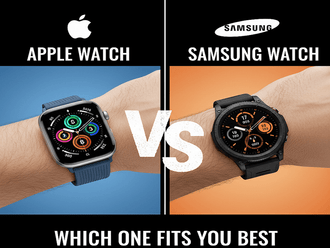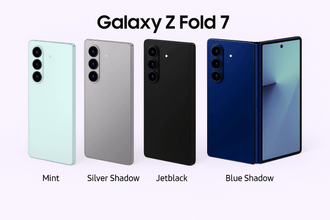
The Future of Mobile Technology: What to Expect in 2025
- 06 Aug, 2024
As humanity strides deeper into the 21st century, technological innovation seems not to abate. The future of mobile technology holds huge potential for improvements with the potential to change the way we use our devices. By 2025, smartphones will have embedded themselves even deeper into our lives with features and capabilities that are unreachable for us even to dream of today. Let us see what we can expect from the smartphone in 2025 and how these innovations are going to shape our future.
How 2025's Smartphone Innovations Will Shape the Tech Landscape
Foldable and Rollable Displays

Maybe the most exciting of all the innovations to be expected in the future of mobile technology is the rise of foldable and rollable displays. These flexible screens are bound to provide users with new and exciting ways of using their products, increasing the device versatility and portability of their potential devices. How about a phone that turns into a tablet with hardly any effort at all? A take on the rollable screen could mean something that you can extend to have more surface to present things on a website or during presentations. The likes of Samsung, LG, and other firms have already set the pace, with these likely to become a staple no later than 2025.
5G and Beyond
Though 5G phones haven't reached its full potential across the world so far, your iPhone 2025 is likely to be geared up for 6G. All the enhancements in connectivity listed above allude to high-speed Internet, low latencies, and reliable connections which we share. That is going to change how we are going to use our smartphones, whereby real-time activities like high-definition video streaming, cloud gaming, and video calling are going to feel seamless and instant.
Augmented Reality (AR) Implementation
Increased-to-a-large-extent augmented reality is going to have its future in mobile technology. By 2025, AR functionality will already be tightly embedded in smartphones, deeply redefining the way we engage with our surroundings. Starting from gaming, shopping, education, and up to navigation, it is going to deliver all-around immersive experiences that blur the lines between the digital and physical worlds. For example, you aim your phone at some gizmo in a shop and immediately see reviews, and price comparisons, and may even try it on in an AR virtual setting.
Advanced AI and Machine Learning
In 2025, Artificial Intelligence (AI) and Machine Learning (ML) will be at the core of the smartphone, making the device even smarter and more intuitive, with the ability to understand and cater to our needs. From personalized recommendations to even more advanced voice assistants that can carry out complex tasks, AI will enhance functionality and user experience in nonpareil ways on a smartphone.
Improved Battery Technology

Battery life has always been a concern with smartphone users. In the future of mobile technology, battery performance is going to increase manifold. Prolonged battery life, and quicker charge times in 2025 will be the order of the day, and probably a few other alternative power sources too, including solar charging, so that our smartphones can keep up with our increasingly connected lives.
Enhanced Security Features
Because of the masses becoming attached to smartphones as the years progress, the current demand for security features will skyrocket. The smartphone of 2025 will be augmented with advanced security technologies like biometrics, including facial recognition and fingerprint sensors, AI leveraging for threat detection, and communication channels protected by encryption. These features will keep our data, and by extension our privacy, safe, consequently providing us with peace of mind in a digital world.
Seamless Integration with IoT

The Internet of Things (IoT) is set to revolutionize how we interact with our surroundings, and smartphones will be at the heart of this transformation. By 2025, our phones will seamlessly integrate with various IoT devices, from smart home appliances to wearable technology. This connectivity will allow for more streamlined and automated experiences, making our lives more convenient and efficient.
Advanced Camera Technology
Smartphone manufacturers have always stressed that camera technology is a never-ending march to improvement. This trend will continue by 2025, this translates more to far-advanced camera systems in terms of increasing resolution, bettering low-light performance, and computational photography. Things like AI-driven image processing will enable 8K recording, increasing periscope zoom lenses to become standard for users, making photo and video capturing equal to professional levels.
Sustainable and Eco-Friendly Designs

Since there is a rapidly growing environmental awareness, it can be expected that the 2025 smartphone will have a lot of input in terms of sustainability. The manufacturers will use more eco-friendly materials, more of recyclable components, and energy-efficient production processes. In addition to that, efforts will be made toward designs that are more durable to reduce e-waste and increase the lifespan of devices.
Personalized and Adaptive Interface
The smartphone user interface by 2025 will be the most personalized and adaptive ever. User interfaces will be so customized with the analysis done by AI in respect of a user's behaviors that they make navigation, and usage will be organic. Features like adaptive brightness, context-aware suggestions, and dynamic app organization will be at the forefront of tools intending to help a man-machine interface perform better.
What models to expect in 2025?
In 2025, several exciting smartphones are set to launch, featuring cutting-edge technology and innovative designs:

Samsung Galaxy S25 Series:
Expected to launch in January 2025, the Galaxy S25 series will likely include the S25, S25+, and S25 Ultra models. These phones are rumored to feature Qualcomm's Snapdragon 8 Gen 4 processor, promising significant performance enhancements. The Ultra model may continue to use Samsung's ISOCELL sensors for its cameras, offering upgraded ultrawide or telephoto lenses (Stuff) (Android Central) (Android Central).
Samsung Galaxy Z Flip 7 and Z Fold 7:
Samsung is also expected to release its next generation of foldable phones, the Galaxy Z Flip 7 and Z Fold 7, in 2025. These devices will likely incorporate advanced features and improved designs to enhance user experience (Stuff) (Android Central).
Google Pixel 10 Series:
The Pixel 10 series, potentially featuring custom Tensor chipsets, will continue Google's tradition of integrating advanced AI capabilities and high-quality cameras into their smartphones (TechRadar).
OnePlus 13:
The OnePlus 13 is expected to feature the latest Snapdragon 8 Gen 4 processor, offering top-notch performance and potentially new camera technologies (TechRadar).
Xiaomi 15 Line:
Xiaomi is set to launch its 15 series smartphones, which will likely include various models catering to different market segments, all powered by the Snapdragon 8 Gen 4 chipset (TechRadar).
These upcoming smartphones promise to deliver exceptional performance, innovative features, and advanced camera systems, making 2025 an exciting year for mobile technology enthusiasts.
Conclusion
More so, the smartphone of 2025 will be expected with very massive features and capabilities. From foldable displays to 6G connectivity, advanced artificial intelligence, to improved security, several innovations are going to change the way we are interacting with our devices and the coming world. The future of mobile technology looks pretty great, and so equipping ourselves with such knowledge will enable us to maximize the amazing opportunities that lay ahead.
FAQs
Q. What will be the key aspects to look out for in a smartphone in 2025?
Smartphones with foldable and rollable displays, 6G connectivity, evolved AI, better battery tech, enhanced security elements, without any transition IoT, and an advanced camera system.
Q. How will 6G connectivity transform mobile technology soon?
6G will, of course, be the successor of 5G, with faster internet, lower latency, and more dependable connectivity, rendering the structure of things like streaming, gaming, and real-time video calls completely different.
Q. What would be the role of AI in smartphones by 2025?
Making smartphones smarter and intuitively brilliant in recommendations, voice assistance, and next-gen experiences from machine learning.
Q. How would sustainability be tackled in the future of mobile technology?
Mobile manufacturers would work toward environment-friendly materials, easily degradable components, less energy-intensive production processes, and rugged, durable designs to minimize waste to the environment and electronic waste.





























